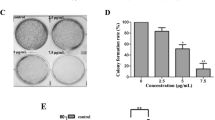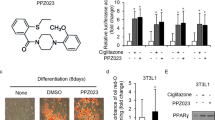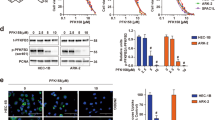Abstract
The role of cyclooxygenase-2 (COX-2) in cancer remains controversial. Using cervical carcinoma cells (HeLa), the present study investigates the involvement of COX-2 in apoptosis elicited by the chemotherapeutics paclitaxel, cisplatin and 5-fluorouracil. Each compound led to a profound induction of COX-2 expression and prostaglandin (PG) synthesis, accompanied by a substantial decrease of viability and enhanced apoptosis. Cells were significantly less sensitive to apoptotic death when either COX-2 expression or its activity was suppressed by small-interfering RNA (siRNA) and by the selective COX-2 inhibitor NS-398, respectively. Experiments performed to clarify how COX-2 leads to apoptosis revealed a profound proapoptotic action of PGD2 and its dehydration product, 15-deoxy-Δ12,14 PGJ2 (15d-PGJ2). In line with these findings, chemotherapeutics-induced apoptosis was prevented by siRNA targeting lipocalin-type PGD synthase (L-PGDS), which catalyses the isomerization of PGH2 to PGD2. Moreover, apoptosis by chemotherapeutics, PGD2 and 15d-PGJ2 was suppressed by the peroxisome proliferator-activated receptor γ (PPARγ) antagonist, GW-9662 or PPARγ siRNA. Finally, a COX-2-dependent apoptotic mechanism of all investigated chemotherapeutics was confirmed in human lung cancer cells (A549) as well as in another cervical carcinoma cell line (C33A). Collectively, this study suggests COX-2 induction and synthesis of L-PGDS-derived, PPARγ-activating PGs as a decisive target by which several chemotherapeutics induce apoptosis. COX-2 is therefore suspected to sensitize cancer cells to apoptotic death under certain circumstances, suggesting that COX-2 inhibition during cancer therapy could diminish its efficacy.
This is a preview of subscription content, access via your institution
Access options
Subscribe to this journal
Receive 50 print issues and online access
$259.00 per year
only $5.18 per issue
Buy this article
- Purchase on Springer Link
- Instant access to full article PDF
Prices may be subject to local taxes which are calculated during checkout








Similar content being viewed by others
Abbreviations
- COX-2:
-
cyclooxygenase-2
- 5-FU:
-
5-fluorouracil
- L-PGDS:
-
lipocalin-type prostaglandin D synthase
- NSAID:
-
nonsteroidal antiinflammatory drug
- PG:
-
prostaglandin
- PPARγ:
-
peroxisome proliferator-activated receptor γ
- siRNA:
-
small-interfering RNA
References
Altorki NK, Keresztes RS, Port JL, Libby DM, Korst RJ, Flieder DB . (2003). Celecoxib, a selective cyclooxygenase-2 inhibitor, enhances the response to preoperative paclitaxel and carboplatin in early-stage non-small-cell lung cancer. J Clin Oncol 21: 2645–2650.
Argiris A, Kut V, Luong L, Avram MJ . (2006). Phase I and pharmacokinetic study of docetaxel, irinotecan, and celecoxib in patients with advanced non-small cell lung cancer. Invest New Drugs 24: 203–212.
Chen Q, Chen J, Sun T, Shen J, Shen X, Jiang H . (2004). A yeast two-hybrid technology-based system for the discovery of PPARγ agonist and antagonist. Anal Biochem 335: 253–259.
Chen YC, Shen SC, Tsai SH . (2005). Prostaglandin D2 and J2 induce apoptosis in human leukemia cells via activation of the caspase 3 cascade and production of reactive oxygen species. Biochim Biophys Acta 1743: 291–304.
Clay CE, Namen AM, Atsumi G, Willingham MC, High KP, Kute TE et al. (1999). Influence of J series prostaglandins on apoptosis and tumorigenesis of breast cancer cells. Carcinogenesis 20: 1905–1911.
Csiki I, Morrow JD, Sandler A, Shyr Y, Oates J, Williams MK et al. (2005). Targeting cyclooxygenase-2 in recurrent non-small cell lung cancer: a phase II trial of celecoxib and docetaxel. Clin Cancer Res 11: 6634–6640.
Danesi R, Innocenti F, Fogli S, Gennari A, Baldini E, Di Paolo A et al. (2002). Pharmacokinetics and pharmacodynamics of combination chemotherapy with paclitaxel and epirubicin in breast cancer patients. Br J Clin Pharmacol 53: 508–518.
Denkert C, Furstenberg A, Daniel PT, Koch I, Kobel M, Weichert W et al. (2003). Induction of G0/G1 cell cycle arrest in ovarian carcinoma cells by the anti-inflammatory drug NS-398, but not by COX-2-specific RNA interference. Oncogene 22: 8653–8661.
Dommels YE, Haring MM, Keestra NG, Alink GM, van Bladeren PJ, van Ommen B . (2003). The role of cyclooxygenase in n-6 and n-3 polyunsaturated fatty acid mediated effects on cell proliferation, PGE2 synthesis and cytotoxicity in human colorectal carcinoma cell lines. Carcinogenesis 24: 385–392.
Eichele K, Weinzierl U, Ramer R, Brune K, Hinz B . (2006). R(+)-methanandamide elicits a cyclooxygenase-2-dependent mitochondrial apoptosis signaling pathway in human neuroglioma cells. Pharm Res 23: 90–94.
Gupta RA, DuBois RN . (2001). Colorectal cancer prevention and treatment by inhibition of cyclooxygenase-2. Nat Rev Cancer 1: 11–21.
Hinz B, Ramer R, Eichele K, Weinzierl U, Brune K . (2004). Up-regulation of cyclooxygenase-2 expression is involved in R(+)-methanandamide-induced apoptotic death of human neuroglioma cells. Mol Pharmacol 66: 1643–1651.
Hwang DH, Fung V, Dannenberg AJ . (2002). National Cancer Institute workshop on chemopreventive properties of nonsteroidal anti-inflammatory drugs: role of COX-dependent and -independent mechanisms. Neoplasia 4: 91–97.
Kim J, Yang P, Suraokar M, Sabichi AL, Llansa ND, Mendoza G et al. (2005). Suppression of prostate tumor cell growth by stromal cell prostaglandin D synthase-derived products. Cancer Res 65: 6189–6198.
Lalier L, Cartron PF, Pedelaborde F, Olivier C, Loussouarn D, Martin SA et al. (2007). Increase in PGE2 biosynthesis induces a Bax dependent apoptosis correlated to patients' survival in glioblastoma multiforme. Oncogene 26: 4999–5009.
Maccarrone M, Pauselli R, Di Rienzo M, Finazzi-Agro A . (2002). Binding, degradation and apoptotic activity of stearoylethanolamide in rat C6 glioma cells. Biochem J 366: 137–144.
Na HK, Inoue H, Surh YJ . (2005). ET-18-O-CH3-induced apoptosis is causally linked to COX-2 upregulation in H-ras transformed human breast epithelial cells. FEBS Lett 579: 6279–6287.
Na HK, Surh YJ . (2003). Peroxisome proliferator-activated receptor γ (PPARγ) ligands as bifunctional regulators of cell proliferation. Biochem Pharmacol 66: 1381–1391.
Narko K, Ristimaki A, MacPhee M, Smith E, Haudenschild CC, Hla T . (1997). Tumorigenic transformation of immortalized ECV endothelial cells by cyclooxygenase-1 overexpression. J Biol Chem 272: 21455–21460.
Nugent FW, Mertens WC, Graziano S, Levitan N, Collea R, Gajra A et al. (2005). Docetaxel and cyclooxygenase-2 inhibition with celecoxib for advanced non-small cell lung cancer progressing after platinum-based chemotherapy: a multicenter phase II trial. Lung Cancer 48: 267–273.
Pan CX, Loehrer P, Seitz D, Helft P, Juliar B, Ansari R . (2005). A phase II trial of irinotecan, 5-fluorouracil and leucovorin combined with celecoxib and glutamine as first-line therapy for advanced colorectal cancer. Oncology 69: 63–70.
Ramer R, Weinzierl U, Schwind B, Brune K, Hinz B . (2003). Ceramide is involved in R(+)-methanandamide-induced cyclooxygenase-2 expression in human neuroglioma cells. Mol Pharmacol 64: 1189–1198.
Shen ZN, Nishida K, Doi H, Oohashi T, Hirohata S, Ozaki T et al. (2005). Suppression of chondrosarcoma cells by 15-deoxy-Δ12,14-PGJ2 is associated with altered expression of Bax/Bcl-xL and p21. Biochem Biophys Res Commun 328: 375–382.
Steinbach G, Lynch PM, Phillips RK, Wallace MH, Hawk E, Gordon GB et al. (2000). The effect of celecoxib, a cyclooxygenase-2 inhibitor, in familial adenomatous polyposis. N Engl J Med 342: 1946–1952.
Tsujii M, DuBois RN . (1995). Alterations in cellular adhesion and apoptosis in epithelial cells overexpressing prostaglandin endoperoxide synthase 2. Cell 83: 493–501.
Xu Z, Choudhary S, Voznesensky O, Mehrotra M, Woodard M, Hansen M et al. (2006). Overexpression of COX-2 in human osteosarcoma cells decreases proliferation and increases apoptosis. Cancer Res 66: 6657–6664.
Zhang X, Morham SG, Langenbach R, Young DA . (1999). Malignant transformation and antineoplastic actions of nonsteroidal antiinflammatory drugs (NSAIDs) on cyclooxygenase-null embryo fibroblasts. J Exp Med 190: 451–459.
Acknowledgements
This work was supported by grants from the Deutsche Krebshilfe eV (Bonn, Germany), Deutsche Forschungsgemeinschaft (SFB 539, TP BI.6) and Johannes und Frieda Marohn Stiftung (Erlangen, Germany).
Author information
Authors and Affiliations
Corresponding author
Rights and permissions
About this article
Cite this article
Eichele, K., Ramer, R. & Hinz, B. Decisive role of cyclooxygenase-2 and lipocalin-type prostaglandin D synthase in chemotherapeutics-induced apoptosis of human cervical carcinoma cells. Oncogene 27, 3032–3044 (2008). https://doi.org/10.1038/sj.onc.1210962
Received:
Revised:
Accepted:
Published:
Issue Date:
DOI: https://doi.org/10.1038/sj.onc.1210962
Keywords
This article is cited by
-
Cannabinoids as anticancer drugs: current status of preclinical research
British Journal of Cancer (2022)
-
Resolution of inflammation as a novel chemopreventive strategy
Seminars in Immunopathology (2013)
-
Prostaglandin (PG)D2 and 15-deoxy-Δ12,14-PGJ2, but not PGE2, mediate shear-induced chondrocyte apoptosis via protein kinase A-dependent regulation of polo-like kinases
Cell Death & Differentiation (2010)
-
Enhanced 5-fluorouracil cytotoxicity in high cyclooxygenase-2 expressing colorectal cancer cells and xenografts induced by non-steroidal anti-inflammatory drugs via downregulation of dihydropyrimidine dehydrogenase
Cancer Chemotherapy and Pharmacology (2010)
-
R(+)-Methanandamide-Induced Apoptosis of Human Cervical Carcinoma Cells Involves A Cyclooxygenase-2-Dependent Pathway
Pharmaceutical Research (2009)



